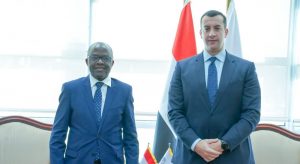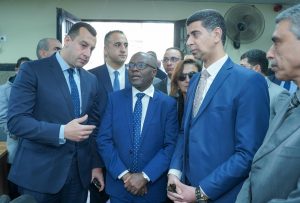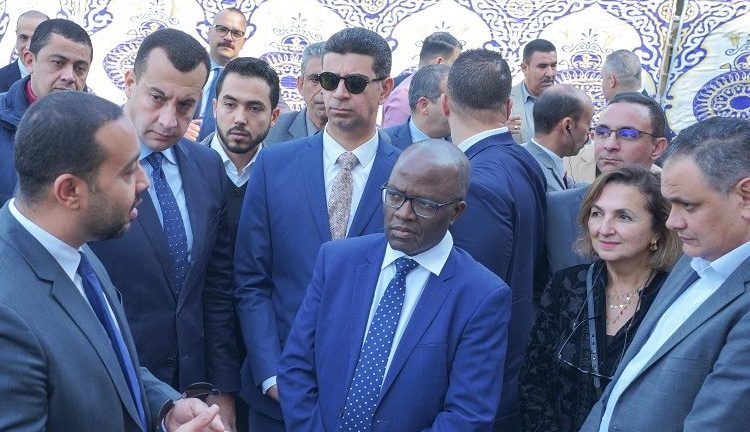Eng. Hossam El-Gamal, Executive President of the National Telecommunications Regulatory Authority of Egypt (NTRA), received today Dr. Cosmas Zavazava, Director of Telecommunication Development Bureau (BDT) in the International Telecommunication Union (ITU), during his visit to Egypt in response to the invitation extended by NTRA’s Executive President to Dr. Zavazava to visit Egypt and recognize the Egyptian model to provide and disseminate telecom services within the national project, “Haya Karima,” which aims at developing Egypt’s countryside.

To this end, both sides set off on a tour in some villages of “Shibin Al-Qanater” in Al-Qalyubiah, which are targeted by “Haya Karima.”
The tour was made in the presence of Mr. Ahmed Badawy, Chief of Telecommunication and Information Technology Committee in Egypt’s Parliament, and Parliament members: Mr. Samir Sobhy, Mr. Mostafa El-Qammar, and Mr. Medhat El-Qammar.
The tour was also attended by Dr. Samir Hammad, Deputy-Governor of Al-Qalyubiyah Governorate, as well as Eng. Mohamed Nasr, Chief Executive Officer of Telecom Egypt, and aimed to introduce the efforts of the Egyptian State to deploy and reinforce landline and mobile infrastructure. It also meant to review the efforts exerted by the State to raise awareness, build capacities, and educate citizens on how to use digital services in order to achieve digital and financial inclusion.

Eng. Hossam El-Gamal, NTRA’s Executive President, clarified that within the efforts made by most countries to tighten the divide between urban and rural areas in terms of utilities and public services provided to citizens, in line with Sustainable Development Goals (SDGs) 2030, the Egyptian State adopted a methodology that takes the side of citizens as it has not only sought to tighten the divide but also to fully bridge it.
Eng. Hossam El-Gamal also expressed that the ITU was keen on recognizing Egypt’s pioneering model to provide connectivity at rural areas in order to achieve digital inclusion, improve the quality of life, achieve integration among all utilities and public services for all citizens, and empower all segments of society to become a part of the different State’s programs and projects, through reinforcing and facilitating digital services at unconnected areas as well as providing an information infrastructure, being integrated rights for all citizens alongside other basic utilities.
It’s worth noting that “Haya Karima” is utilized by 58 million citizens most of which are living in Egypt’s countryside, and was praised by many international organizations concerned with development; it was classified by the United Nations as one of the best developmental initiatives worldwide.
Furthermore, Eng. Hossam El-Gamal explained that NTRA, during the Initiative’s first phase, implemented a plan through Universal Service Fund (USF), in cooperation with the private sector represented by the licensed operators in Egypt’s market, to make sure all individuals of society have access to telecom services.
The plan entailed the intensification of mobile coverage in “Haya Karima” villages by establishing 1096 new mobile stations, 594 of which were funded by NTRA via USF, by a 43%-increase in the number of mobile stations covering phase 1- villages. This step took place to boost 4G voice and mobile internet coverage for 899 villages within phase 1, at a total cost of EGP 4 billion, and modernize 576 existing mobile stations.
From his side, Dr. Cosmas Zavazava, Director of ITU- Telecommunication Development Bureau (BDT), praised Egypt’s model to provide connectivity and telecom services and bridge the digital divide, describing it as a pioneering model that is looked up to, particularly in rural areas where telecom services are much needed.
He also pointed out that the ITU backs the objectives of “Haya Karima” Initiative since they are aligned with his vision and the goals of the ITU’s Development Sector (ITU-D) goals, namely: achieving digital inclusion, bridging the digital divide and accelerating digital transformation to achieve social as well as economic development for all people.
During the tour, both sides visited the Government Service Center in Shibin Al-Qanater to identify its capacity and role in providing digital services to citizens and reviewed the projects of reinforcing landline and mobile networks infrastructure in the village of “Arab El-Sawalha.” Eventually, training and education programs at the primary school of “Al-Ahraz” Village were also reviewed.
It’s noteworthy that Dr. Cosmas Zavazava took office as Director of the ITU/BDT on January 1, 2023, with an experience of more than 30 years in telecommunications. Prior to his election as BDT Director, he oversaw development-related projects, strategic partnerships and took part in launching new initiatives that boosted capacity-building and the engagement of private-sector in development.






Discussion about this post